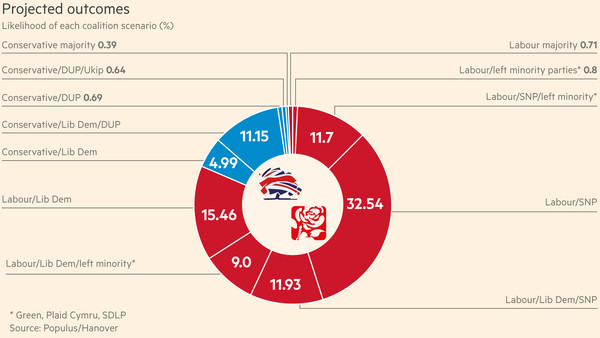polls move in Miliband’s favour, Uk Election ,UK general Election 2015, UK opinion poll,British General election
- Details
- Last Updated: Friday, 17 April 2015 18:24
UK General election: polls move in Miliband’s favour

Research group Populus has published the latest update to its Predictor, a proprietary computer model which analyses polling and other data to assign probabilities to different scenarios after the forthcoming general election.
Populus managing director Rick Nye comments on this week’s findings:
As attention has turned to Scotland again this week with the two debates between the party leaders there and the future of Trident once again becoming an issue, it is perhaps worth remembering that without the surge in support for the SNP the debate would currently be about whether Labour were on course to win enough seats to govern by itself or if it would fall slightly short.
As it is, the Populus/Hanover Election Outcome Predictor shows the race to become the largest party after the next election is still close. The central seat projections - reflecting a new round of polling from Michael Ashcroft in Conservative-Labour marginal seats and 5 out of the last 9 polls putting Labour ahead of the Tories - have moved slightly in Labour’s favour.
|
United Kingdom General Election 2015 |
||
It now has 278 seats, up three on last week, the Conservatives have 270 seats, down four, putting the two main parties back to where they were a fortnight a ago. Labour are now the largest party in 58% of the simulations and Ed Miliband becomes prime minister on more than four occasions in every five.
Labour’s best hope of breaking the current deadlock would appear to lie in recovering some of the ground they have lost to the SNP in Scotland.
Since the independence referendum the SNP has remained consistently at or around the 45% it attained in the 2011 Holyrood election and which said “Yes” to independence back in September. This has given the nationalists a lead of about 20% over Labour which equates to a 20% swing between the parties since the 2010 general election.
If this swing were universally applied across all the seats in Scotland, Labour would lose more than 30 and end up with only 10 seats compared with the SNP’s total of nearly 50.
However if Jim Murphy were to claw back 5% of voters from the SNP to Labour between now and 7th May he could more than double that projected number of Scottish Labour MPs from 10 to 22, turning a catastrophe into merely a severe setback, in the process making Labour’s task of becoming the largest party UK-wide much easier.
Of course, things could also go the other way. If the SNP were to take a further 2% from Labour compared with where the polls stand today, Labour would be left with just 5 MPs in Scotland.
src:www.ft.com


